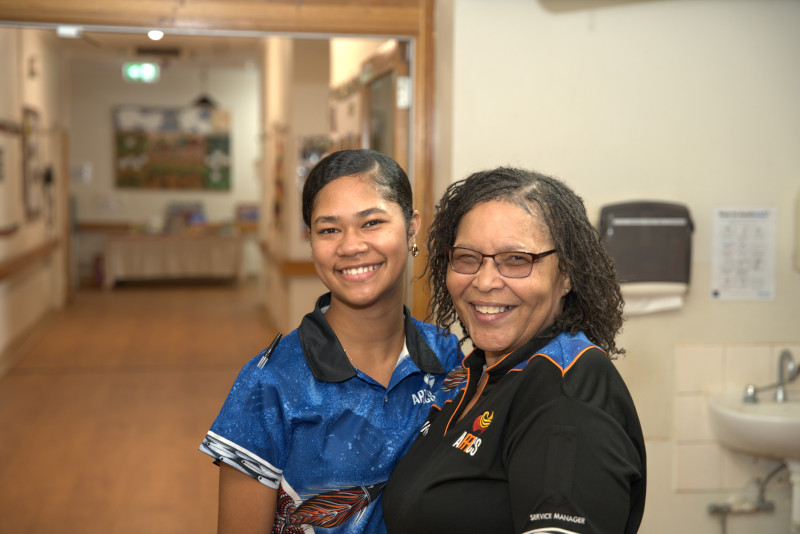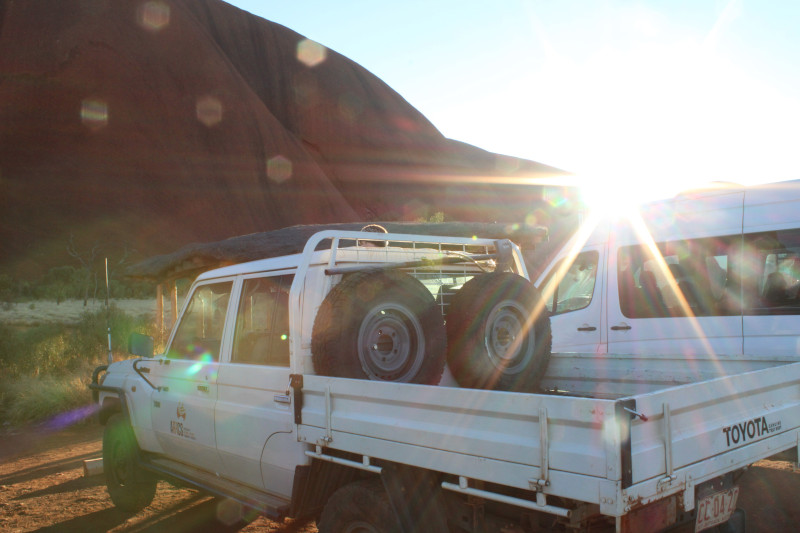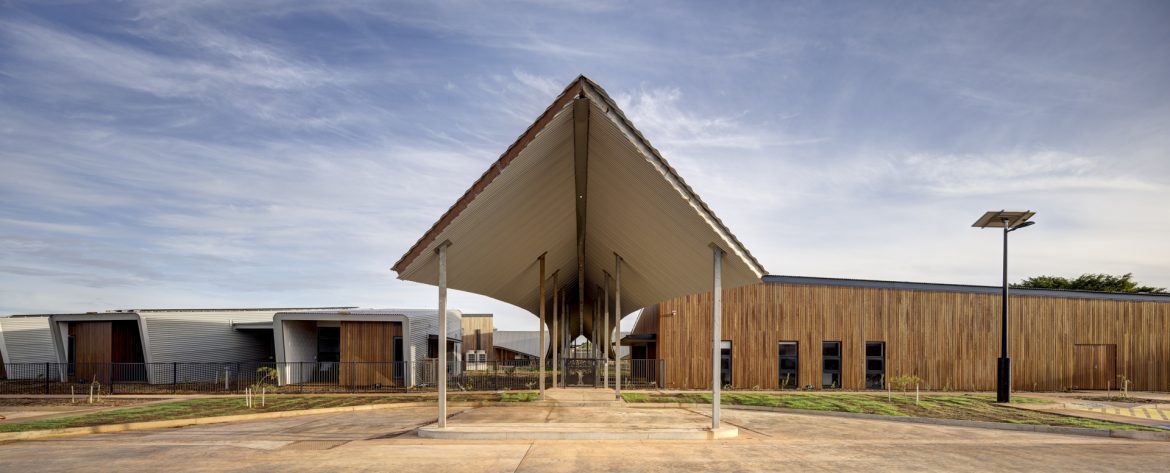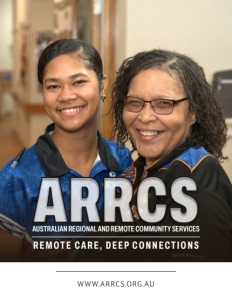Australian Regional and Remote Community Services (ARRCS)
Remote Care, Deep Connections
Caring for the Community while respecting cultural integrity
Focusing on First Nations communities, Australian Regional and Remote Community Services (ARRCS) has become vital in caring for the Northern Territory’s aging population since its establishment in 2014. Wendy Hubbard, the General Manager of ARRCS, provides insight into the organization’s history, its commitment to cultural integrity, and the challenges and innovations shaping its operations.
A unique foundation and vision
ARRCS was established in 2014 to address the growing need for aged care services in the Northern Territory, particularly within First Nations communities. UnitingCare Queensland stepped in to support the creation of ARRCS, which operates with its own dedicated board and governance structure. This framework allows ARRCS the flexibility to adapt to the unique circumstances of the Northern Territory while maintaining strong oversight.
At its core, ARRCS’s vision goes beyond simply providing services. “We want to be recognized as the best-aged care provider for First Nations people in the Northern Territory,” says Hubbard. This vision drives every aspect of ARRCS’s operations, ensuring that all elders in the territory, both Aboriginal and non-Aboriginal, receive care that honors and respects their cultural identities.
Delivering care to remote landscapes
ARRCS’s approach to care is distinct, particularly in its willingness to operate in some of Australia’s most remote and underserved regions. “When no one else will go in, we’ll go in,” Hubbard states, capturing the organization’s pioneering spirit. ARRCS operates in areas such as Nhulunbuy, Tennant Creek, Mutitjulu, and Docker River, where populations can be as small as 350 people. These communities are not just remote; they are often inaccessible, facing extreme weather conditions and significant logistical challenges.
ARRCS provides a comprehensive range of services in these remote areas, ensuring no elder is left without support. These services include residential and community-based aged care and the delivery of meals, medications, and laundry services to community members who meet government criteria. “Once somebody can’t live at home, we take them into residential aged care,” Hubbard explains, describing a seamless continuum of care.
These services are designed to mirror those provided in mainstream aged care facilities but with adaptations for the unique conditions of remote Australia. “In Docker River, for example, it gets up to 50 degrees and down to minus three,” Hubbard notes, highlighting the extreme conditions that residents and staff must endure. Despite these challenges, ARRCS remains committed to providing high-quality care, even in the most difficult environments.

Cultural sensitivity at the core
ARRCS’s approach is rooted in cultural sensitivity, especially in its work with First Nations communities. The focus is a strategic priority and a core aspect of ARRCS’s identity. “We have cultural specialists at each site who are responsible for integrating cultural practices into the care we provide,” says Hubbard. These specialists, fluent in local languages and attuned to the cultural contexts of their communities, ensure that the care provided is both respectful and effective.
Cultural sensitivity is particularly important in workforce management challenges. ARRCS employs a diverse workforce, many of whom come from overseas. Before the COVID-19 pandemic, the organization relied on workers from Nepal and other countries who would gain permanent residency through their work with ARRCS. “COVID stopped all that,” Hubbard recalls, forcing ARRCS to rethink its approach to staffing.
In response, ARRCS became the first aged care provider to participate in the Pacific Labor Scheme, a government initiative originally designed to bring in workers for agricultural jobs. “We teach people how to be personal care assistants, they get a qualification, and they stay with us for up to four years,” Hubbard explains. This program has brought in about 130 workers from the Pacific Islands, who have become an integral part of ARRCS’s workforce. However, this also introduces new challenges, particularly regarding cultural integration.
“Our workforce includes many non-English speaking workers, and we must ensure that they can communicate effectively with our First Nations residents, who may speak 10 to 15 different languages,” Hubbard notes. This requires a careful balancing act, as ARRCS must navigate the cultural differences between its staff and the communities they serve. The organization’s commitment to cultural sensitivity is evident in its ongoing efforts to provide training and support to its workforce, ensuring that all staff are equipped to provide care that respects the cultural identities of the residents.
Sensory rooms
Recently, ARRCS completed a 32-bed residential facility in Nhulunbuy, East Arnhem. “We finished the Nhulunbuy project on December 22, 2022,” Hubbard reports. This facility reflects ARRCS’s dedication to delivering high-quality care in some challenging environments. But the organization is not stopping there. Another ambitious project is underway in Docker River, where a new 26-bed facility is being built with a $34 million grant.
The Docker River project is particularly complex due to the remote location and extreme conditions. “It’s a desert environment, so we’re using modular buildings constructed in Alice Springs,” Hubbard explains. The project has a tight timeline, with a very short window to transport and assemble the modules.
Another innovative initiative that ARRCS has pioneered is the development of sensory rooms specifically designed for First Nations residents with dementia or behavioral issues. These rooms feature videos and sounds that resonate with the local population’s cultural experiences.
“The videos are orchestrated by First Nations people, showing things like water running on rocks or digging Witchetty Grubs,” Hubbard describes. These sensory rooms have proven incredibly effective in calming residents and providing comfort to those in palliative care who cannot be on their traditional lands. “It’s a way for us to bring the country to them,” says Hubbard, emphasizing the profound impact these rooms have had on the residents’ well-being.

Overcoming challenges
Despite its many successes, ARRCS faces significant challenges, particularly workforce management. “Workforce is a huge issue everywhere, especially in regional and remote NT,” Hubbard acknowledges. The pandemic exacerbated these challenges, particularly in Alice Springs, where ARRCS once relied on agency nurses for 21 out of 24 positions. “That was horrifically expensive,” Hubbard notes, adding that the situation was unsustainable in the long term. However, through a concerted effort to recruit and retain staff, ARRCS has reduced its dependence on agency nurses, making its operations more sustainable.
Accommodation for staff is another critical issue, particularly in remote areas where housing is scarce and often expensive. In response, ARRCS recently received a $6.4 million grant to develop staff housing in Alice Springs, specifically for workers from the Pacific Islands.
“The government gave us funds to create a communal living space that aligns with their cultural practices,” Hubbard explains. This project is not just about providing housing; it is about creating a supportive community where workers can feel at home despite being far from their countries.
Cultural integrity
A dedication to cultural integrity drives ARRCS’s mission, especially its service to First Nations communities. This dedication goes beyond offering culturally appropriate care; it’s about honoring the cultural heritage of the communities ARRCS serves. “People want to look after the elders, but it’s really hard in the community,” Hubbard reflects. This is particularly true in the Northern Territory, where cultural practices can vary significantly from one community to the next.
“First Nations people want to be on country when they die, but sometimes it’s just not possible,” Hubbard notes. The sensory rooms ARRCS has developed bring country to these residents, providing them peace and connection in their final days. “It’s a way for us to honor their cultural practices, even when we can’t physically bring them home,” Hubbard adds.
Future impact
Through its innovative projects, such as sensory rooms and the construction of new aged care facilities, ARRCS is setting a new standard for aged care in remote Australia. These initiatives and a commitment to cultural integrity ensure that all elders, particularly First Nations people, receive the dignity and care they deserve in their twilight years.
As ARRCS continues to evolve and grow, it remains an example of how aged care can be delivered in a way that respects and honors the cultural identities of the communities it serves. “The Territory is a remarkable place, and it’s a privilege to provide care to the elders who have done so much for their communities,” Hubbard concludes.
AT A GLANCE
Australian Regional and Remote Community Services (ARRCS)
What: A not-for-profit organization that provides care and support services, including aged care and community programs, to individuals living in regional and remote areas of the Northern Territory.
Where: Headquartered in Darwin, Northern Territory, Australia
Website: https://www.arrcs.org.au/
PREFERRED VENDORS
Fox Education and Consultancy – www.fox.edu.au
Fox Education and Consultancy is a privately owned and operated RTO. Providing quality, flexible and contemporary education and training in the areas of enrolled nursing, aged care, disability care, allied health assistance, health services assistance, Aboriginal and/or Torres Strait Islander primary health care.
Lead Consultants Pty Ltd – www.leadconsultants.com.au
Lead Consultants specialises in all areas of construction and development consulting. Through our professional and client-specific service, competitive pricing and personal management style, Lead has evolved into a well-resourced and knowledgeable consultancy firm servicing clients across all sectors of the development industry. Whether your project is local, remote, interstate or international, Lead will keep you a step ahead on your next project.






 This information will never be shared to third parties
This information will never be shared to third parties